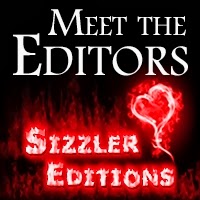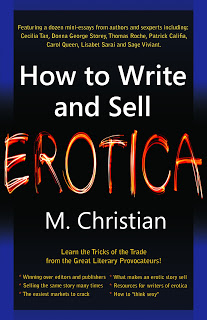Sizzler Editions & Creative Sexuality
Education Presents
“Meet The Editors”

Free Live Interactive Web Event
Sat. June 29, 2013
5:00–6:30 pm East Coast time
2:00-3:30 West Coast time
M. Christian
Sascha Illyvich
Jean Marie Stine
Anyone with web access can join-in free from anywhere in the world and participate through microphone, webcam, or text chat. Participants can get expert guidance from writing professionals – without having to drive to and from a crowded, noisy event facility and with no costly fees.
Current and aspiring writers of erotica, erotic romance, and sexuality-themed nonfiction won’t want to miss this live, interactive, online discussion and Q&A with three highly successful editors/authors, hosted by Sizzler Editions and Creative Sexuality.
Editors M.Christian, Sascha Illyvich, and publisher Jean Marie Stine will provide insight into trends and taboos in the field. They will offer writing tips and tricks, and advice on marketing and promotion of books. In a live, interactive session, they will take and answer questions from those who have logged in for the event.
Participants will:
· Hear expert advice on formatting, submitting, and publishing your book; Develop and strengthen writing, plot development, and characterization;
· Learn the most effective ways to market and publicize a book;
· Have the opportunity to ask questions about the writing and publishing process;
· Be able to pitch their own erotic story, novel or nonfiction.
All three panelists are writers as well as editors/publishers, with several decades of experience to their credit, and are well-versed in the craft and business of writing. They will address topics and questions such as:
· Trends in Erotic Romance and Erotica
· Writing your book
· Covers
· Promoting and Publicizing
· Publishing
…and
it these are only some of the issues to be covered in this multifaceted opportunity to interact live over the web with professional editors.
Who will benefit? Anyone who:
· Is thinking of writing hot romance or erotica.
· Is writing their first erotic novel, story or work of sexuality-related nonfiction.
· Has finished writing one or more erotic books, but doesn’t know what to do next.
· Has questions about the writing process.
· Has questions about the publishing process (including self-publishing).
· Is seeking effective ways to publicize and grow readership for their books.
· Is already published or self-published, but wants to know more about the business and craft of writing erotica.
For further details visit: http://crsex.org/meettheeditors
Or contact: [email protected]
SizzlerEditions.com
CreativeSexuality.org











